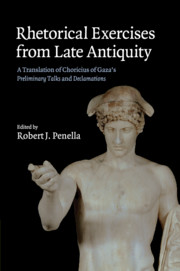 Rhetorical Exercises from Late Antiquity
Rhetorical Exercises from Late Antiquity Book contents
- Frontmatter
- Contents
- List of contributors
- Foreword
- Introduction
- I CHORICIUS, PRELIMINARY TALKS
- II CHORICIUS, DECLAMATIONS
- 2 Declamation 1 [X]:
- 3 Declamation 2 [XII]:
- 4 Declamation 3 [XIV]:
- 5 Declamation 4 [XVII]:
- 6 Declamation 5 [XX]:
- 7 Declamation 6 [XXIII]:
- 8 Declamation 7 [XXVI]:
- 9
- 10 Declamation 9 [XXXV]:
- 11 Declamation 10 [XXXVIII]:
- 12 Declamation 11 [XL]:
- 13 Declamation 12 [XLII]:
- Epilogue: The fortune and reception of Choricius and of his works
- Bibliography
- Index
13 - Declamation 12 [XLII]: <An Orator>
from II - CHORICIUS, DECLAMATIONS
Published online by Cambridge University Press: 29 January 2010
- Frontmatter
- Contents
- List of contributors
- Foreword
- Introduction
- I CHORICIUS, PRELIMINARY TALKS
- II CHORICIUS, DECLAMATIONS
- 2 Declamation 1 [X]:
- 3 Declamation 2 [XII]:
- 4 Declamation 3 [XIV]:
- 5 Declamation 4 [XVII]:
- 6 Declamation 5 [XX]:
- 7 Declamation 6 [XXIII]:
- 8 Declamation 7 [XXVI]:
- 9 Declamation 8 [XXIX]:
- 10 Declamation 9 [XXXV]:
- 11 Declamation 10 [XXXVIII]:
- 12 Declamation 11 [XL]:
- 13 Declamation 12 [XLII]:
- Epilogue: The fortune and reception of Choricius and of his works
- Bibliography
- Index
Summary
[THEME]
The law has conferred on a person who has brought a war to a successful conclusion the right to seek what prize he wishes and has provided that his request is to be granted. When a city was besieged, an orator, having dared to leave the city, went out alone for a conference with the enemy and persuaded them to lift the siege and invoked the law deeming him worthy to receive a reward. A military man speaks against him, arguing that the law grants prizes to one prevailing by arms, not to one persuading by words.
EXPLANATORY COMMENT
[1] You can find a model from comedy of how a military man is full of himself and a swaggerer and a great boaster. If any of you remembers Menander's character Thrasonides, he knows what I mean. Menander says that, when military stuffiness, like a disease, attacks a man, it moves his girlfriend to disgust. And “The Hated One,” of course, became a title for the play about Thrasonides. [2] It was because I had this example in my mind, I think, that I naturally introduced a soldier into my imaginary theme. For who is more likely to begrudge someone who has brought a war to a successful conclusion [by non-military means] than a person whose profession is warfare? And so on the one hand a kind of innate contempt buoys up the man, but malice and envy gnaw at him.
- Type
- Chapter
- Information
- Rhetorical Exercises from Late AntiquityA Translation of Choricius of Gaza's Preliminary Talks and Declamations, pp. 241 - 260Publisher: Cambridge University PressPrint publication year: 2009


